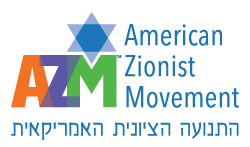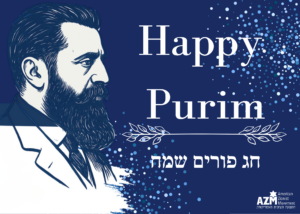AZM President Richard D. Heideman Addresses Jewish Agency Task Force on Antisemitism
October 2018, Tel Aviv
Click here to listen to a recording or read the full transcript below.
“So I come to this side so that my back isn’t into anyone because I believe the subject we have to discuss today is crucially important.
I would like to ask your permission of all of you to speak so that I and you can speak freely here, and one of the reason that I ask that is as the president of the American Zionist movement which has 29 organizations that covers the spectrum of Jewish life both religious point of view but also organizationally with their different philosophies.
Regularly I am cautioned and asked to be careful with what I say so as not to offend any one of our organizations.
Here I would like the permission to speak very directly and very clearly, if I offend anyone I apologize.
Yaakov, I thank you for inviting me. The last time I was at the task force on anti-Semitism, I never would’ve guessed that a decade later things would be so much worse, because we spend in Jewish resources tremendous people time, money, energy, effort, vision, coordination, we spend so much resources to make Jewish life better.
We spend so many resources to assure a continuity of our people, respect for our people, safety for our people and security for the state of Israel in the hearts of all of us. But things really have gotten terribly worse. Yaakov commented on events that have happened in this part of the world and that part of the world.
People are dying, and they are people and the only reason they are being attacked is because they’re Jews, whether it be in Paris or whether it be anywhere else, they’re being attacked because they’re Jews. And the subject that Yaakov raised is absolutely right. Fear is increasing, some might say fear is rampant. We have Jewish communities where people are more than just afraid to wear a kippah. We have Jewish communities where people are afraid to identify as Jews. I would like to suggest to you that this task force should take upon itself the responsibility that between now and our next meeting, that we will have adopted a policy of zero tolerance. We must be standing up against every single incident of anti-Semitism, whether it be a physical attack, whether it be a personal attack, whether it be a verbal attack, or whether it take some other form – ranging from terrorism to diplomacy against Israel and the Jewish people. Our kids on the college campuses are suffering terribly. For years we’ve noted that they’re incapable of discussing the issues, they’re unwilling to go into the college classrooms and discuss Israel because they don’t want to be criticized. And now we have a situation such as just showed itself at my own Alma Mater, the University of Michigan, where a professor refused to give the equivalent of a letter of recommendation (one particular first) for a student to come and study at Tel Aviv University. I want you to know what I did when that happened. I chose not to go to the AZM and ask permission to do something. Instead, as an alumnus of the University, I went to my son-in-law who is an alumnus of the University, and we went to his former college roommate, at Michigan, who is the son of a former Congressman, and the three of us stayed up all night and we crafted a letter to the president of the university within hours of the incident, so that by the next morning when the president’s office opened, they had our letter. And our letter demanded that there be a formal review of this first professor. The letter demanded that there be a systemwide University review of all attitudes of antisemitism in that entire university. We’re talking about one of the largest universities with an alumni organization that is one of the biggest in the United States. We wrote to the president and requested an immediate meeting, that we were prepared to fly immediately.
We Immediately got a response from two people in the president’s office. They asked us for what were our views, what were are recommendations. We had discussions, and I am not taking credit for anything, I’m simply saying that particular president, of that particular University did something. Is it enough? No. Is there much more to do? Yes. Has now a second Professor Taken a public position? I don’t care that the first Professor was sanctioned. I would do the same thing and I will do so tomorrow.
This is one university in one city in one country. We have Jews all over the world who are really suffering. In proposing to you a zero tolerance policy for this task force, I propose that we need more than just reporting. We need more than just coordination. We need to have both strategies and tactics put together so that people know what to do and feel empowered to do it without waiting and asking for permission because time is crucial just like we believed that writing to the president of the University of Michigan was crucial to do now. And I must tell you, Yaakov, you don’t even know this but I went to that president of that university and invited him to come to speak at the conference that we’re doing between AZM and WZO on November 5 in New York.
We have a wonderful letter applauding that we are doing a conference together on countering Anti-Semitism and anti Zionism on the campus with regards and apologies that the president due to other commitments cannot come but In their letter they said that they applaud what we’re doing, they encourage us to keep doing it. We’ve also reached out for our joint symposium to the president of Columbia university where the situation is terrible. We’re awaiting an answer.
Now it’s not so important if they come, although we want to have them come, it’s important that we are taking action and asking.
I’ll go one step further, we have a letter of invitation out to the assistant secretary for civil rights at the department of education, Ken Marcus, who is terrific, and we’re awaiting clearance whether he could come to our symposium. If he doesn’t come it’s only because of clearance issues because of various department of education policy issues, but Ken Marcus is an example of doing what I suggested, Zero Tolerance. When he became the assistant secretary for civil rights, one of the first things he did was reinstate a case about anti-Semitism at Rutgers that had been white washed and closed. And now it’s back on the table. So I would like to suggest that we need a multi-prong approach. We have to applaud those who are bringing litigation. We have to encourage those that are bringing litigation to be wise about litigation and not just simply to shoot from the hip. We have to remember that there is another forum of the court and it’s called the court of public opinion and we don’t use the court of public opinion. We must start doing so and I suggest that we should do so. Every single incident that occurs, zero tolerance because the old attitude was ‘sha, still’ – it will be ok. Well, 10 years ago when I sat here, I never would have envisioned that we would need what we need today. And what we need today is a coordinated integrated clear plan of action that has every one of our organizations, every one of our leaders around the world feeling strong, Yaakov, feeling strong that you, that the task force, that the WZO, that the Sochnut, that all the Jewish organizations with all the resources are all together. We are going to stand up against anti-Semitism.
My last comment. You know we have a hotbed of anti Semitism at the United Nations.
We have to do something about it. The AZM and the WZO are doing something about it. In case you’re not aware of it, AZM brought forty UN Ambassadors, with ambassador Danny Danon under his leadership, some came to Poland for Yom HaShoah forty of them came to Israel for Yom Ha’Atzmaut. It has changed their attitude because they came and they saw. They had no idea of the beauty, they only now of the hatred. They have no idea that the border is right there or what we live under or our families live under And only by coming and seeing the way birthright brings, we have to do a diplomatic warfare, a counter warfare I would call it, back to every single ambassador around the world. In Washington alone we have, I think 192 embassies. In New York, I think we have 192 missions.
Right in those two cities, we have all these countries. But here’s my last point. In every one of your countries you have ambassadors from many countries. When there is an incident in Argentina, go see the ambassador of Argentina in your country. Request an appointment. Take with you somebody. Or go alone. Write an article, write an op-Ed. Schedule a speech and show up. And if nobody is there to listen, put a camera up and then put it out on the web. My last comment. You know, fear is a terrible thing. The Jewish people don’t deserve to be afraid. The Jewish people deserve all the pride in the world for the rich contributions we have made to ourselves but also to the entire world.
And I would like to conclude by saying that the theme of zero tolerance should really mean that, so that when we next gather the situation is many fold better not worse. Thank you.”




